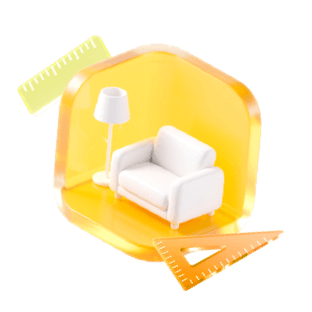Designing a 3D floor plan can breathe life into your ideas and enhance your space visualization, especially when utilizing tools like Homestyler. This guide will navigate you through the steps necessary to create a captivating 3D floor plan representation.
Step 1: Project Initialization
Start by opening Homestyler and initiating a new project. Select a template that aligns with your design intentions, whether it's for a residential environment or commercial purposes. Properly setting up your project from the beginning establishes a robust groundwork for the design process.
Step 2: Crafting the Floor Plan
After your project is initialized, head to the floor plan section. Utilize the wall tool to outline the walls of your layout. Ensure that you modify the dimensions to meet your design specifications while using alignment tools for heightened accuracy.
Step 3: Incorporating Doors and Windows
Introduce doors and windows into your design through the relevant tools available in Homestyler. Strategically place them to improve the spatial flow and maximize the influx of natural light.
Step 4: Establishing Levels and Grids
Define the various levels of your design to create height distinctions between floors. Implement grid tools to form a structural grid, which will assist you in subsequent design phases.
Step 5: Adding Furnishings and Elements
To animate your floor plan, begin populating it with furniture and other elements. Leverage Homestyler’s vast library to choose items that resonate with your design aesthetic. Place them thoughtfully to make the most of the available space.
Step 6: Transitioning to 3D View
When your floor plan is ready, switch to the 3D viewing option. This feature allows you to rotate and reposition the view to appreciate your design from various perspectives.
Step 7: Enhancing Your 3D Floor Plan
While in 3D view, refine your models by modifying materials, colors, and finishes. Homestyler enables you to apply diverse textures to both walls and furnishings, giving your design a more realistic feel.
Step 8: Rendering Your Creation
Utilize the rendering capabilities of Homestyler to generate a refined presentation of your design. This will assist you in visualizing how your space will actually appear, complete with appropriate lighting and shadows.
Step 9: Saving and Exporting Your Project
Finally, save your work and export your 3D floor plan as required. You can produce images, PDFs, or even immersive 3D models to share with clients or other stakeholders.
Conclusion
Crafting a 3D floor plan is not just a technical endeavor but an artistic expression that allows you to manifest your design concept. By honing this skill with tools like Homestyler, along with attention to every detail, you can achieve impressive designs.
FAQ
Q: Is it feasible to create a 3D floor plan without any previous experience in Homestyler? A: While having prior knowledge can be helpful, Homestyler provides a variety of tutorials and resources that facilitate learning for beginners.
Q: What benefits do 3D floor plans offer? A: 3D floor plans offer a more precise representation of spaces, helping users to visualize and articulate design concepts effectively.
Q: Can individuals collaborate on projects within Homestyler? A: Yes, Homestyler allows for collaboration, enabling multiple users to contribute to the same project simultaneously.
Welcome to your Free 3D Floor Planner experience!



























































